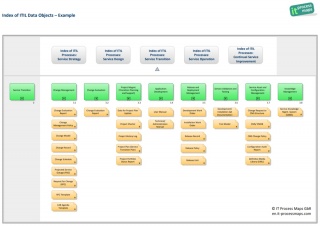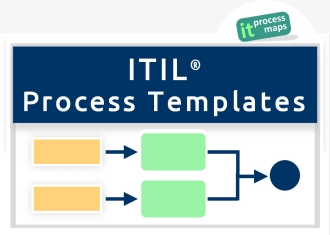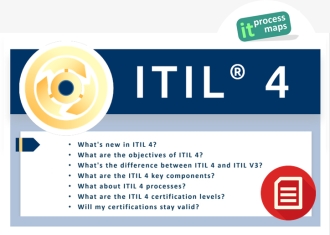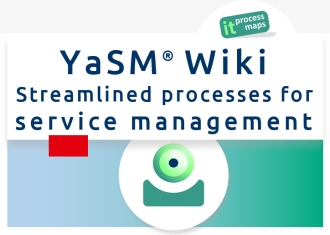ITIL Glossary/ ITIL Terms K: Difference between revisions
Created page with "<seo metakeywords="ITIL glossary definitions acronyms meanings terms words itsm it-service-management K" metadescription="Use this ITIL Glossary to look up the definitions of ..." |
No edit summary |
||
| (One intermediate revision by the same user not shown) | |||
| Line 1: | Line 1: | ||
< | <itpmch><title>ITIL Glossary/ ITIL Terms K | IT Process Wiki</title> | ||
<meta name="keywords" content="ITIL glossary definitions acronyms meanings terms words itsm it-service-management K" /> | |||
<meta name="description" content="Use this ITIL Glossary to look up the definitions of ITIL terms starting with the letter K: Key Performance Indicator (KPI), Knowledge Management, ..., Known Error Database." /> | |||
</itpmch> | |||
__NOTOC__ | __NOTOC__ | ||
<imagemap> | <imagemap> | ||
Image:Thumb-glossary-itil.jpg|right|[[ITIL Glossary|'''ITIL Glossary:''']]<br />All terms related to ITIL (ITIL 2011, ITIL V3 & V2) and IT Service Management | Image:Thumb-glossary-itil.jpg|right|[[ITIL Glossary|'''ITIL Glossary:''']]<br />All terms related to ITIL (ITIL 4, ITIL 2011, ITIL V3 & V2) and ITSM (IT Service Management)|320px|alt=ITIL Glossary|thumb | ||
default [[ITIL Glossary]] | default [[ITIL Glossary]] | ||
desc bottom-left | desc bottom-left | ||
| Line 13: | Line 16: | ||
|} | |} | ||
This ITIL glossary includes definitions for key terms and acronyms of ITIL and ITSM (IT service management) in alphabetical order.[[ITIL Glossary/_ITIL_Terms_1-9#ITIL|['''1''']]] | |||
[[ITIL Glossary#All ITIL Terms| | [[ITIL Glossary#All ITIL Terms|View the full list]] or use the alphabetical indes: | ||
{| | {| | ||
| Line 27: | Line 30: | ||
<p> </p> | <p> </p> | ||
<p><span id="top"> </span></p> | <p><span id="top-k"> </span></p> | ||
==ITIL Terms | ===ITIL Terms beginning with <big>K</big>=== | ||
---- | |||
Please click on one of the terms to see its definition. | Please click on one of the terms to see its definition. | ||
| Line 37: | Line 39: | ||
<p> </p> | <p> </p> | ||
* [[#Key Performance Indicator (KPI)|Key Performance Indicator (KPI)]] | *[[#Key Performance Indicator (KPI)|Key Performance Indicator (KPI)]] | ||
* [[#Knowledge Management|Knowledge Management]] | *[[#Knowledge Management|Knowledge Management]] | ||
* [[#Knowledge Manager|Knowledge Manager]] | *[[#Knowledge Manager|Knowledge Manager]] | ||
* [[#Known Error|Known Error]] | *[[#Known Error|Known Error]] | ||
* [[#Known Error Database|Known Error Database]] | *[[#Known Error Database|Known Error Database]] | ||
* [[#KPI Target Value|KPI Target Value]] | *[[#KPI Target Value|KPI Target Value]] | ||
<p> </p> | <p> </p> | ||
| Line 49: | Line 51: | ||
====Key Performance Indicator (KPI)==== | ====Key Performance Indicator (KPI)==== | ||
* A Metric that is used to help manage a process, service or activity. | *A Metric that is used to help manage a process, service or activity. | ||
* Many Metrics may be measured, but only the most important of these are defined as [[ITIL Key Performance Indicators|KPIs]] and used to actively manage and report on the process, service or activity. | *Many Metrics may be measured, but only the most important of these are defined as [[ITIL Key Performance Indicators|KPIs]] and used to actively manage and report on the process, service or activity. | ||
* [[ITIL Key Performance Indicators|KPIs]] should be selected to ensure that efficiency, effectiveness, and cost effectiveness are all managed. | *[[ITIL Key Performance Indicators|KPIs]] should be selected to ensure that efficiency, effectiveness, and cost effectiveness are all managed. | ||
====Knowledge Management==== | ====Knowledge Management==== | ||
* → ITIL processes, [[ITIL | *→ ITIL processes, [[ITIL Service Transition|ITIL Service Transition]] > [[Knowledge Management]] | ||
====Knowledge Manager==== | ====Knowledge Manager==== | ||
* → Roles within ITIL, [[ITIL Roles#Knowledge Manager|Knowledge Manager]] | *→ Roles within ITIL, [[ITIL Roles#Knowledge Manager|Knowledge Manager]] | ||
* The Knowledge Manager ensures that the IT organization is able to gather, analyze, store and share knowledge and information. | *The Knowledge Manager ensures that the IT organization is able to gather, analyze, store and share knowledge and information. | ||
* His primary goal is to improve efficiency by reducing the need to rediscover knowledge. | *His primary goal is to improve efficiency by reducing the need to rediscover knowledge. | ||
====Known Error==== | ====Known Error==== | ||
* A Known Error is a problem that has a documented root cause and a Workaround. | *A Known Error is a problem that has a documented root cause and a Workaround. | ||
* Known Errors are managed throughout their lifecycle by the Problem Management process. | *Known Errors are managed throughout their lifecycle by the Problem Management process. | ||
* The details of each Known Error are recorded in a Known Error Record stored in the [[ITIL Glossary#Known Error Database|Known Error Database (KEDB)]]. | *The details of each Known Error are recorded in a Known Error Record stored in the [[ITIL Glossary#Known Error Database|Known Error Database (KEDB)]]. | ||
* As a rule, Known Errors are identified by Problem Management, but Known Errors may also be suggested by other Service Management disciplines, e.g. Incident Management, or by suppliers. | *As a rule, Known Errors are identified by Problem Management, but Known Errors may also be suggested by other Service Management disciplines, e.g. Incident Management, or by suppliers. | ||
* → ITIL processes, [[ITIL | *→ ITIL processes, [[ITIL Service Operation|ITIL Service Operation]] > [[Problem Management]] | ||
====Known Error Database==== | ====Known Error Database==== | ||
* The Known Error Database (KEDB) is created by Problem Management and used by Incident and Problem Management to manage all Known Error Records. | *The Known Error Database (KEDB) is created by Problem Management and used by Incident and Problem Management to manage all Known Error Records. | ||
* → ITIL processes, [[ITIL | *→ ITIL processes, [[ITIL Service Operation|ITIL Service Operation]] > [[Problem Management]] | ||
====KPI Target Value==== | ====KPI Target Value==== | ||
* The to-be value of a [[ITIL Key Performance Indicators|Key Performance Indicator (KPI)]]. | *The to-be value of a [[ITIL Key Performance Indicators|Key Performance Indicator (KPI)]]. | ||
* It is the responsibility of the [[ITIL Roles#Process Owner|Process Owners]] to manage and optimize processes so that KPI targets are achieved. | *It is the responsibility of the [[ITIL Roles#Process Owner|Process Owners]] to manage and optimize processes so that KPI targets are achieved. | ||
* → ITIL processes, [[ITIL | *→ ITIL processes, [[ITIL CSI - Continual Service Improvement|ITIL Continual Service Improvement (CSI)]] > [[Process Evaluation]] | ||
<p> </p> | <p> </p> | ||
<div align="right">[[#top|→ ITIL terms starting with "K"]]</div> | <div align="right">[[#top-k|→ ITIL terms starting with "K"]]</div> | ||
<div align="right">[[ITIL Glossary#All ITIL Terms|→ Look up all ITIL terms]]</div> | <div align="right">[[ITIL Glossary#All ITIL Terms|→ Look up all ITIL terms]]</div> | ||
| Line 87: | Line 89: | ||
'''<span id="ITIL">Notes</span>''' | '''<span id="ITIL">Notes</span>''' | ||
[1] ITIL® is a Registered Trade Mark of AXELOS Limited. — IT Infrastructure Library® is a Registered Trade Mark of AXELOS Limited. | |||
[2] Source (partially): ITIL glossary and abbreviations © AXELOS Limited. All glosseries and terms for the AXELOS Global Best Practice Portfolio, including glosseries for ITIL v3 and ITIL 4 in various languages, are available for download on the [https://www.axelos.com/glossaries-of-terms AXELOS web site]. | |||
<html> | <html>By:  Stefan Kempter <a href="https://www.linkedin.com/in/stefankempter"><img style="margin:0px 0px 0px 0px;" src="/images/bookmarking/linkedin.png" width="16" height="16" title="By: Stefan Kempter | Profile on LinkedIn" alt="Author: Stefan Kempter, IT Process Maps GbR" /></a>  and  Andrea Kempter <a href="https://www.linkedin.com/in/andreakempter"><img style="margin:0px 0px 0px 0px;" src="/images/bookmarking/linkedin.png" width="16" height="16" title="By: Andrea Kempter | Profile on LinkedIn" alt="Contributor: Andrea Kempter, IT Process Maps GbR" /></a>, IT Process Maps.</html> | ||
<a | |||
<small> | <small> | ||
<html> | <html> | ||
<p> | <p> | ||
<span itemscope="itemscope | <span itemprop="breadcrumb" itemscope itemtype="http://schema.org/BreadcrumbList"> | ||
<a href="https://wiki.en.it-processmaps.com/index.php/Main_Page | <span itemprop="itemListElement" itemscope itemtype="http://schema.org/ListItem"> | ||
</span> | <a itemprop="item" href="https://wiki.en.it-processmaps.com/index.php/Main_Page"> <span itemprop="name">ITIL Wiki</span></a><meta itemprop="position" content="1" /></span> › | ||
<span | <span itemprop="itemListElement" itemscope itemtype="http://schema.org/ListItem"> | ||
<a href="https://wiki.en.it-processmaps.com/index.php/ITIL_Glossary | <a itemprop="item" href="https://wiki.en.it-processmaps.com/index.php/ITIL_Glossary"> <span itemprop="name">ITIL Glossary</span></a><meta itemprop="position" content="2" /></span> › | ||
</span> | <span itemprop="itemListElement" itemscope itemtype="http://schema.org/ListItem"> | ||
<span | <a itemprop="item" href="https://wiki.en.it-processmaps.com/index.php/ITIL_Glossary/_ITIL_Terms_K"> <span itemprop="name">ITIL Glossary: Terms starting with K</span></a> | ||
<a href="https://wiki.en.it-processmaps.com/index.php/ITIL_Glossary/_ITIL_Terms_K | <meta itemprop="position" content="3" /></span> | ||
</span> | </span></p> | ||
</p> | |||
</html> | </html> | ||
</small> | </small> | ||
Latest revision as of 17:06, 7 February 2019

All terms related to ITIL (ITIL 4, ITIL 2011, ITIL V3 & V2) and ITSM (IT Service Management)
| ITIL Glossary Terms |
This ITIL glossary includes definitions for key terms and acronyms of ITIL and ITSM (IT service management) in alphabetical order.[1]
View the full list or use the alphabetical indes:
| 1 ... 9 |
| A | B | C | D | E | F | G | H | I | J | K | L | M | ||||||||||||
| N | O | P | Q | R | S | T | U | V | W | X | Y | Z |
ITIL Terms beginning with K
Please click on one of the terms to see its definition.
- Key Performance Indicator (KPI)
- Knowledge Management
- Knowledge Manager
- Known Error
- Known Error Database
- KPI Target Value
Definitions
Key Performance Indicator (KPI)
- A Metric that is used to help manage a process, service or activity.
- Many Metrics may be measured, but only the most important of these are defined as KPIs and used to actively manage and report on the process, service or activity.
- KPIs should be selected to ensure that efficiency, effectiveness, and cost effectiveness are all managed.
Knowledge Management
- → ITIL processes, ITIL Service Transition > Knowledge Management
Knowledge Manager
- → Roles within ITIL, Knowledge Manager
- The Knowledge Manager ensures that the IT organization is able to gather, analyze, store and share knowledge and information.
- His primary goal is to improve efficiency by reducing the need to rediscover knowledge.
Known Error
- A Known Error is a problem that has a documented root cause and a Workaround.
- Known Errors are managed throughout their lifecycle by the Problem Management process.
- The details of each Known Error are recorded in a Known Error Record stored in the Known Error Database (KEDB).
- As a rule, Known Errors are identified by Problem Management, but Known Errors may also be suggested by other Service Management disciplines, e.g. Incident Management, or by suppliers.
- → ITIL processes, ITIL Service Operation > Problem Management
Known Error Database
- The Known Error Database (KEDB) is created by Problem Management and used by Incident and Problem Management to manage all Known Error Records.
- → ITIL processes, ITIL Service Operation > Problem Management
KPI Target Value
- The to-be value of a Key Performance Indicator (KPI).
- It is the responsibility of the Process Owners to manage and optimize processes so that KPI targets are achieved.
- → ITIL processes, ITIL Continual Service Improvement (CSI) > Process Evaluation
Notes
[1] ITIL® is a Registered Trade Mark of AXELOS Limited. — IT Infrastructure Library® is a Registered Trade Mark of AXELOS Limited.
[2] Source (partially): ITIL glossary and abbreviations © AXELOS Limited. All glosseries and terms for the AXELOS Global Best Practice Portfolio, including glosseries for ITIL v3 and ITIL 4 in various languages, are available for download on the AXELOS web site.
By: Stefan Kempter ![]() and Andrea Kempter
and Andrea Kempter ![]() , IT Process Maps.
, IT Process Maps.
ITIL Wiki › ITIL Glossary › ITIL Glossary: Terms starting with K






